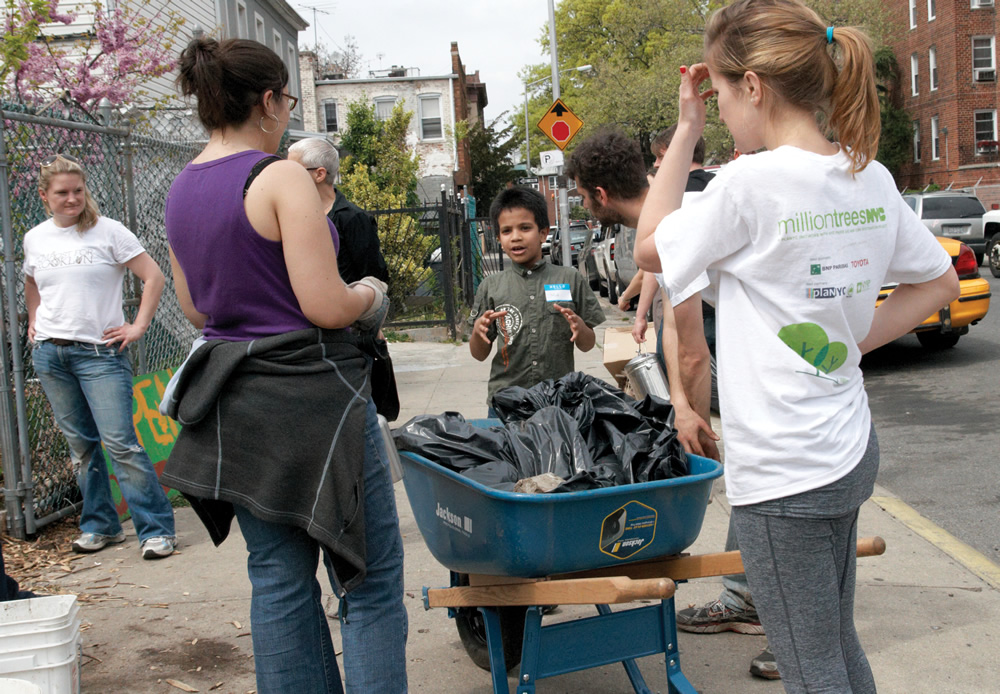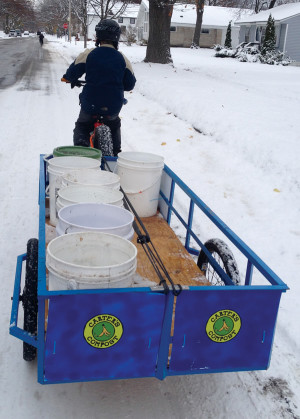More entrepreneurs and activists working to establish composting businesses and community projects are turning to crowdfunding platforms to raise needed capital.
Marsha W. Johnston
BioCycle March/April 2015
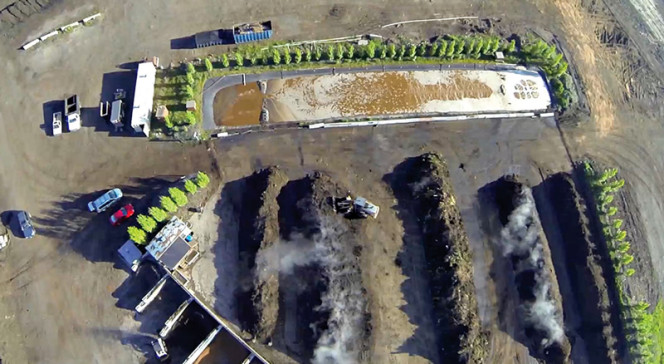
Dirt Hugger, Dallesport, Washington: Raised $65,000 on Kickstarter to help finance move to new composting site.
In 1884, newspaper publisher Joseph Pulitzer used “crowdfunding” to secure the $100,000 needed to build a pedestal for the Statue of Liberty in New York harbor, from 125,000 people donating $1 or less. Such crowdfunding has exploded in our digital age, with an astonishing $1.5 billion raised by 452 crowdfunding operations in 2012, according to a market study released by Crowdsourcing.org. Last May, The Crowdfunding Centre in the United Kingdom released another report, “The State of the Crowdfunding Nation,” which showed that in March 2014, more than US$60,000 was raised every hour via global crowdfunding initiatives. During the same month, notes the report, 442 crowdfunding campaigns were launched globally every day.
In the last few years, entrepreneurs and activists working to establish composting businesses and community projects have turned to crowdfunding platforms. “Traditional lenders started relying on collateral guarantees, so a lot of companies couldn’t get loans if they were putting money back in the business, or if the business was too innovative,” says Jason Riggs, spokesman for Kiva, a crowdfunded loan operation that added U.S. operations to its international work in 2011.
Crowdfunding Types
One of the great attractions of crowdfunding is that it is frequently pure philanthropy: the money is not paid back. Crowdfunding falls into two primary types identified by The Crowdfunding Centre: Rewards crowdfunding and equity crowdfunding. Rewards crowd-funding, is where the company provides some kind of recognition, product or service without incurring debt or sacrificing equity. Equity crowdfunding promises a return on investment.
Rewards crowdfunding is the model for Kickstarter and Indiegogo. Because donations on these platforms are seen as altruistic and the donors are not truly investors, they are not subject to financial regulation by the Securities and Exchange Commission (SEC). The reward promises made to consumers by Kickstarter project owners are subject to Federal Trade Commission (FTC) enforcement (similar to oversight of direct mail and catalogs), but no such FTC enforcement actions have been taken. One prominent lawsuit over a fraudulent Kickstarter project was filed by the attorney general of Washington State, but it was the first.
Rewards crowdfunding sites typically use either a “Keep-it-All” (KIA) or “All-or-Nothing” (AON) process. With KIA, the entrepreneurial firm keeps the entire amount raised regardless of whether or not they meet their funding goal, while AON allows the entrepreneur to keep nothing unless its fundraising goal is achieved.
Equity crowdfunding promises a return on investment and thus, until President Obama signed the Jumpstart Our Business Startups (JOBS) Act into law in April 2012, it was illegal for private businesses to offer equity to anyone other than accredited investors in exchange for funding. In October 2013, the SEC and the Financial Industry Regulatory Authority (FINRA) announced rules whereby FINRA will oversee equity crowdfunding for startup businesses.
Composting is not a common category for crowdfunding platforms; more often they are artistic endeavors, inventions and scientific research. A survey of the most publicly accessible crowdfunding sites shows that those most successful at raising money for composting are ioby, Kickstarter and Kiva. Information on the kinds of companies invested in by equity crowdfunding sites is harder to access, though among those that allow a public search of their offered companies, AngelList shows the largest number.
IOBY
Of the three, only ioby, which calls itself a “crowd-resourcing” platform, actually lists “Compost” as a funding category. On average, ioby’s projects raise $5,000 or less (although up to $70,000 has been raised), and to date, have been heavily concentrated in the New York City area; ioby has funded a dozen composting projects in Brooklyn alone.
“Ioby’s focus is working with people who have positive plans for change in their communities,” says Erin Barnes, one of ioby’s three founders. “Composting is one fantastic solution to lots of environmental issues in communities, so it has always been an important category for us. We have over 50 [compost-related] projects, ranging from composting operations at school and community gardens, compost classes, even an on-line ‘where-to-compost’ map.”
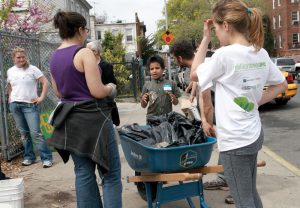
Compost For Brooklyn, Brooklyn, New York: Raised $2,030 on ioby to build new composting bins and sifter.
Ioby’s projects are purely philanthropic, with no rewards or equity provided. “The reward you get is giving back to your community,” she explains, while adding that donating through ioby, an official 501c3, to often-tiny community projects allows donors to claim tax deductions they might not otherwise get. Because many of the groups seeking funds are not formal organizations, Barnes says ioby focuses on verifying the project’s legitimacy and/or legality. The group is in the early stages of a national expansion. Among ioby’s composting projects is Compost For Brooklyn. This “hugely successful” community composter raised $2,030 to build five new composting bins and a new sifter, expand their drop-off hours, and to offer regular workshops and demonstrations.
Kickstarter
Considered a market leader, Kickstarter has funded nearly a dozen composting projects in the U.S. that range from commercial enterprises like Dirt Hugger, Let Us Compost and Greenlid to community efforts like Carter’s Compost and Farmer Pirates. According to its website, Kickstarter was started “as a new way for creators and audiences to work together to make things. The traditional funding systems are risk-averse and profit-focused, and tons of great ideas never get a chance. We thought Kickstarter could open the door to a much wider variety of ideas.”
Kickstarter states up front that when someone donates to a project, it is a direct legal agreement with the creator. Notes the website’s “Trust and Safety” page, “Kickstarter doesn’t evaluate a project’s claims, resolve disputes, or offer refunds — backers decide what’s worth funding and what’s not.” Still, the firm says it protects investors with a dedicated “integrity team” that monitors its system for suspicious activity, screens reports sent in by the community, and takes necessary actions. Its AON funding system, which disburses funds only at the end of a funding period, also provides more time for backers to fully evaluate a project and for the integrity team to investigate any concerns raised by backers.
The earliest composting project listed on Kickstarter is the Western Queens Compost Initiative, in Long Island City, NY, which raised $2,590 in June 2010. It also raised $536 for additional composting equipment on Ioby before it merged with Build It Green!NYC in 2010 (see “The Evolution of New York City’s Big Compost”), changing its name to Build It Green!Compost (BIG!Compost).
Dirt Hugger, Dallesport, Washington
Founders Pierce Louis and Tyler Miller quit their aerospace jobs and started Dirt Hugger in 2010, after Louis learned that his yard trimmings were being shipped up to 250 miles away to a composting facility or dumped into a landfill. They raised $65,000 on Kickstarter in June-July 2014 that they needed to meet the $400,000 cost of moving their facility from The Dalles in Oregon to Dallesport when the Port of Dalles reclaimed its initial site for redevelopment.
Despite the successful campaign, Louis notes they made mistakes, including a video pitch that had too much of a “woe is us, beg and plead” tone. “We were lucky that we had been in business for 4 years, and that got us through,” he says. “If we were to do it again, we would focus more on how our composting facility would meet customers’ needs.” The other mistake, he adds, was offering only token rewards, such as t-shirts, sweatshirts and bags of compost, which they rectified near the end by adding presale of compost as rewards, which appealed to their core customers.
For others considering a comparable Kickstarter project, Louis recommended dedicating two hours every other day for 3 months, before, during and after, to campaign management. He also cautioned that in setting the target amount, project owners must account for the 5 percent fee to Kickstarter and 3.5 percent to Amazon, for payment processing, and the cost of rewards.
Carter’s Compost, Traverse City, Michigan
“Compost on!” is the rallying cry of 10-year-old Carter Schmidt and his dad, Ty, with whom he founded Carter’s Compost, a 100 percent bike-powered kitchen scrap pickup service, in April 2012. Carter’s Compost used Kickstarter in April-May 2014 to raise $4,150 to buy additional bike cargo trailers needed to expand its Community Sustained Compost program. Initially, the Schmidts just wanted two bike trailers bigger than the kid trailers they were using, which were really unwieldy with several heavy compost buckets bungeed together, explains Ty Schmidt. After 14 days of its Kickstarter campaign, Carter’s was 92 percent funded with 45 backers from all over the U.S, with most giving between $10 and $50, but it took the full scheduled month to get 100 percent of the funding needed. In the final week, Carter’s added a $1,200 stretch goal for additional handmade trailers from Kanner Karts in Gainesville, Florida. Carter’s learned about the trailers when the company was featured in a BioCycle article that included its sister company, Gainesville Compost. “We purchased three Kanner Karts with the crowdfunding from our stretch goal,” adds Schmidt. “One of the carts has an axle mount, and it has become Carter’s go-to trailer. The other two ‘big-kid’ trailers have ball hitches on the seat post and are used by adults.”
Carter’s offered typical token rewards: decals, t-shirts, compost pails, compost and mentions on Carter’s Sponsors web page. In the end, five new trailers were purchased — two Surly-brand bike trailers and three Kanner Karts. “Once we got these trailers, it allowed us to scale up, providing a trailer to any of Carter’s 8 bucket slingers who acquire customers in their neighborhood,” notes Schmidt.
Let Us Compost, Athens, Georgia
Let Us Compost, the only commercial curbside residential composting operator in the area, likes to say it has been “starving landfills” since August 2012. Three months later, the company raised $13,166 on Kickstarter to buy 100 roll carts, 100 buckets and a blue truck to expand its business, says Let Us Compost’s founder, Kristen Baskin. She reports that the campaign, from video shoot to reward distribution, took about 2.5 months. Rewards included t-shirts, bumper stickers, compost and paintings by her daughters. “It was awesome,” notes Baskin. “We found out that we had a lot of support in the Athens community. About $5,000 came from locals.”
In the past two years, Let Us Compost has grown to approximately 130 residential and 30 commercial customers, diverting about 1.5 tons per week of food scraps. The firm works regularly with the Athens-Clarke County Solid Waste Department, which began accepting the collected organics last summer. Baskin’s goal for 2015 is 400 residential and 130 business customers, and to begin selling compost to small area businesses in the spring.
Greenlid, Toronto, Ontario
To buy final molds to start production and meet minimum order requirements for their fully compostable organic waste container, brothers Morgan and Jackson Wyatt, founders of Greenlid, raised $25,673 in February-March 2014. The Greenlid is a water-resistant, pulp-molded, 6.5-inch-high by 8.5-inch-diameter counter-top bucket for kitchen scraps. It comes with a green plastic, dishwasher-safe lid for use while the bucket is being filled, and a compostable lid for setting it out in the collection cart. “A Kickstarter campaign not only allows you to get money to start production, but also gives you an idea if people want to buy your product or not,” says Jackson Wyatt. As rewards, they offered various-sized sets of its Greenlid containers. “We were able to show proof of concept with Kickstarter,” he adds. “People have really taken to it, and we’re now in over 250 retail locations across Canada.”
Farmer Pirates, Buffalo, New York
Nearly three years ago, this urban farming cooperative raised $15,231 to scale up its composting operation, says Terra Dumas, compost program administrator. Since then, the composting operation spun off into a limited liability corporation (LLC) from the cooperative, while keeping the Farmer Pirates brand. “The cooperative owns a lot of land in Buffalo and we wanted to better protect those assets from the commercial site of compost hauling and creation,” she explains.
With a bargain lease on 5 acres of land in the city, Farmer Pirates is serving approximately 60 households with two weekly food scrap pickup routes. On the commercial side, five restaurants and Buffalo State College are being serviced. Farmer Pirates, which is paying a “decent wage” to several of the LLC owners, diverted approximately 29 tons of organics in 2014, and hopes to sell some surplus compost this year to community gardeners, Dumas says.
KIVA
Kiva differs from many crowdfunding operations in that it does zero percent interest loans for amounts up to $50,000. Its Kiva Zip subsidiary began operations in the U.S. in 2011. To get a Kiva Zip loan, a “trustee” makes a public statement for the project owner’s credit-worthiness, something that spokesman Riggs calls “social underwriting.” Kiva verifies that an applicant’s household makes less than $100,000/year and checks for any bad financial history. Riggs says financial problems would not disqualify applicants unless they fail to note it on their application. The repayment rate for Kiva Zip is about 85 percent, which he says is on a par with traditional loans. “We are really more about funding Main Street-type mom-and-pop businesses as opposed to the projects found in a lot of crowdfunding operations,” he explains. In the U.S., Kiva has funded Compost Crusader and The Compost Club.
Compost Crusader, Milwaukee, Wisconsin
As part of its compost education mission, Melissa Tashjian’s nonprofit, Kompost Kids, would pick up 5-gallon containers of organics from businesses to get composted. But when the businesses wanted to divert more, she decided to start Compost Crusader LLC, an organics collection service, in April 2014. After determining that none of the local haulers would do the actual collection, Tashjian used money she was saving for a new kitchen to buy a front-loading dump truck, and retrofitted it to service 96-gallon totes and dumpsters. Since beginning pickups in June 2014, Compost Crusader’s 13 customers have diverted over 65 tons of material from the landfill. To further grow the business, Tashjian needed a bigger truck, so she got a $5,000 loan from Kiva Zip in December 2014.
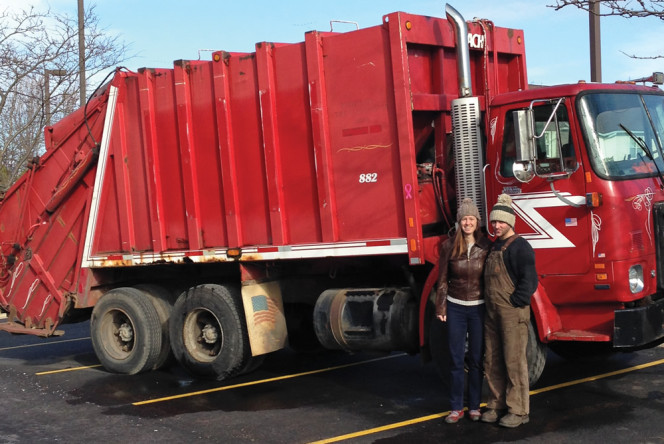
Compost Crusader, Milwaukee, Wisconsin: Received $5,000 loan from Kiva to help purchase a larger organics collection truck.
In January, she combined the Kiva funds with part of the $7,000 grant she got from taking second place in the “Good Money Challenge” organized by Marquette University (and sponsored by Brady Corporation), and bought a new $8,000 dump truck. The remaining grant money is being used to buy compostable Biobags™ to use for collection. “I still would like to do a Kickstarter campaign too, but that will probably be down the line when another big expense comes up,” she notes.
Tashjian has two years to repay the Kiva loan amount, which she considers doable. “We’ve been servicing one school for about two months, and a whole district is interested now,” she adds.
The Compost Club, Healdsburg, California
Rick Kaye, a former agroforestry volunteer for the Peace Corps in Panama, initiated a food waste composting system at his daughter’s school in 2003. Ten years later, the program had evolved into The Compost Club, with 21 participating schools in Sonoma County, diverting 70,000 pounds of organic waste from the landfill annually.
Endorsed by its parent organization, the North Coast Resource Conservation and Development Council, Kaye secured a $5,000 Kiva loan in December 2013 from 144 lenders worldwide to start a vermicomposting business. They installed 18 worm bins at Bucher Dairy, and paid back the full loan amount to Kiva, which disbursed the funds to individual “lenders” by October 2014. The Club anticipates harvesting all of the vermicompost by March and will decide whether to have the dairy operate the bins or move them to schools and businesses. “The Kiva experience was fantastic,” notes Kaye, enabling Compost Club to build momentum and motivation because it validated their mission.
Marsha W. Johnston is Principal of Earth Steward Associates in Arlington, VA and a Contributing Writer to BioCycle.


